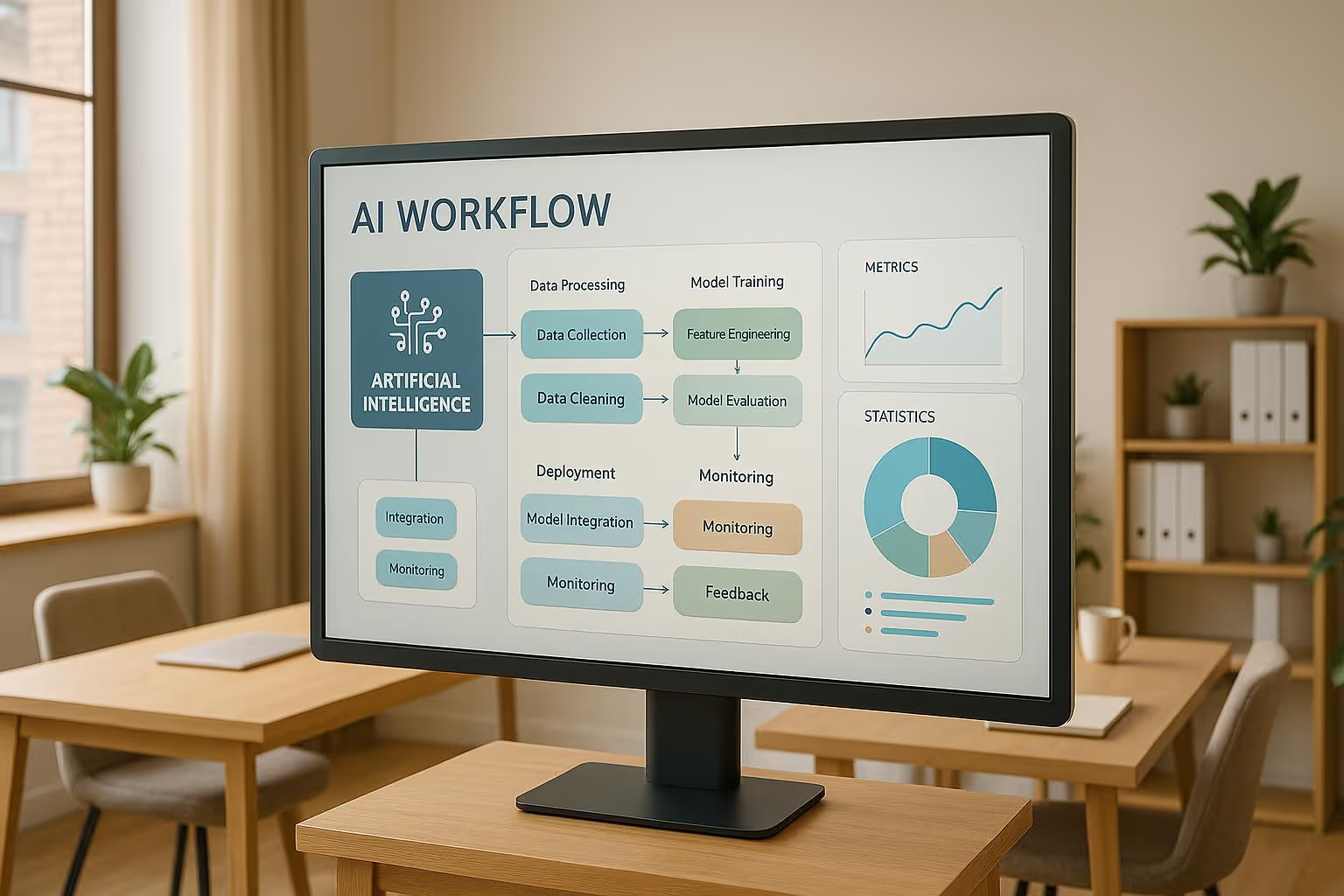
AI governance is critical for managing risks, ensuring compliance, and optimizing workflows in businesses leveraging automation. With increasing regulations like the EU AI Act and U.S. standards from NIST and FTC, companies must adopt robust platforms to maintain accountability and avoid costly penalties. This article highlights eight platforms - Prompts.ai, Credo AI, Fairly AI, FairNow, Domo, ServiceNow, UiPath, and Automation Anywhere - that address governance challenges such as compliance, cost management, and centralized oversight.
Key Insights:
Quick Tip: Select a platform based on your organization’s needs - whether it’s cost savings, compliance, or workflow integration. For example, Prompts.ai is ideal for cost-conscious teams, while Credo AI suits highly regulated industries.
Quick Comparison:
| Platform | Key Features | Best Fit |
|---|---|---|
| Prompts.ai | 35+ AI models, 98% cost savings, TOKN credits | Cost-focused AI-first organizations |
| Credo AI | Risk management, compliance frameworks | Regulated industries |
| Fairly AI | Bias detection, transparency tools | Ethical AI prioritization |
| FairNow | Real-time monitoring, system integration | Immediate oversight needs |
| Domo | BI tools, scalable governance | Data-driven enterprises |
| ServiceNow | IT workflow integration, audit trails | ServiceNow users |
| UiPath | Automation with governance | Automation-heavy businesses |
| Automation Anywhere | Compliance reporting, role-based controls | Strict regulatory environments |
Evaluate your priorities - cost, compliance, or integration - and choose the best fit for your AI governance needs.
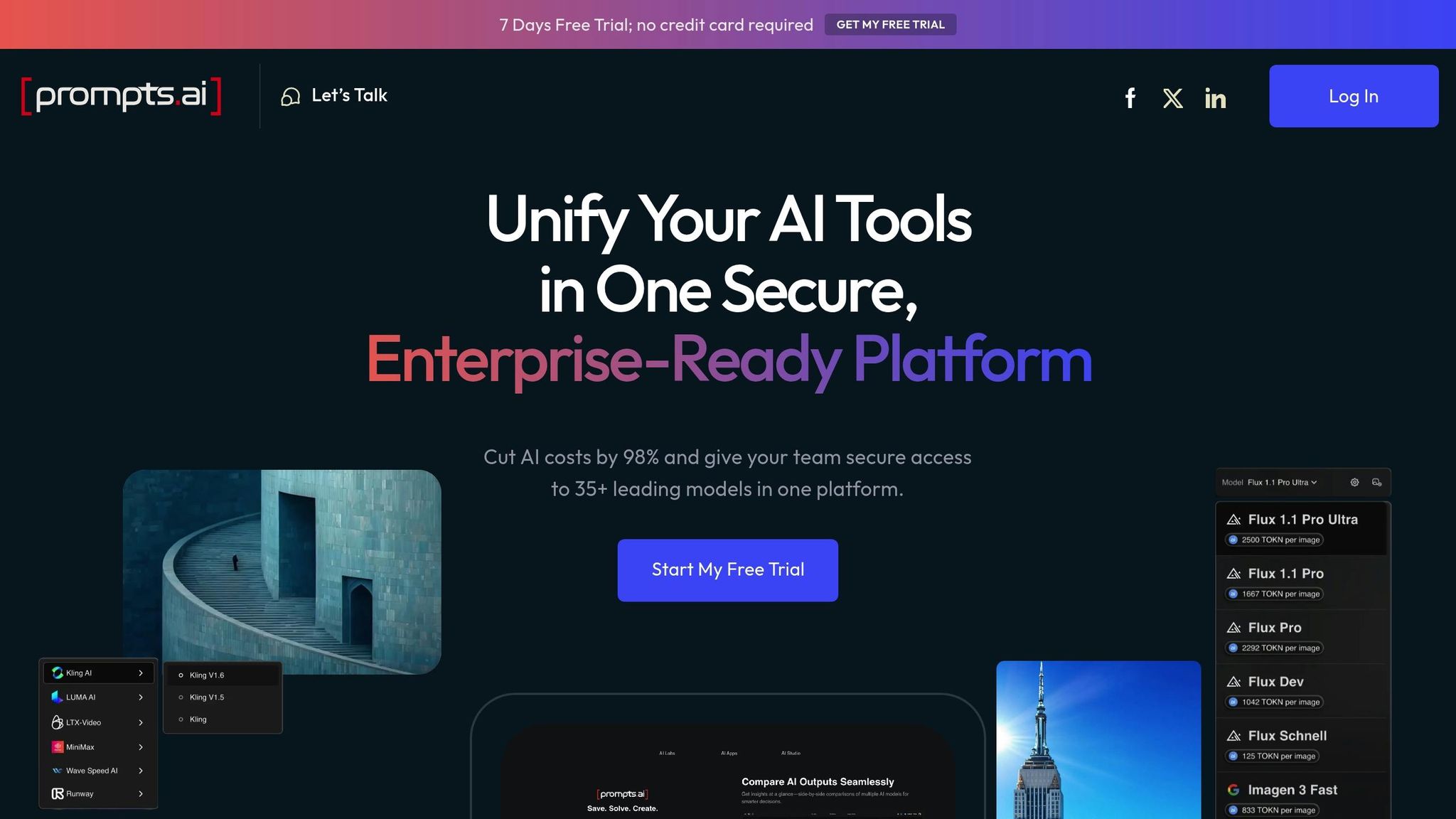
Prompts.ai is a cutting-edge platform designed to streamline AI orchestration while addressing critical challenges in AI governance and workflow automation. By uniting over 35 top-tier large language models - such as GPT-4, Claude, LLaMA, and Gemini - under one secure interface, it eliminates the inefficiencies of fragmented workflows. This unified approach ensures governance consistency across teams and simplifies AI management. Here's how Prompts.ai tackles key governance issues:
With advanced security measures and governance frameworks, Prompts.ai safeguards sensitive data, helping businesses stay compliant with ever-changing regulatory requirements. This eliminates the need to transfer sensitive information to external systems, ensuring data remains secure and within control.
Prompts.ai’s integrated FinOps layer provides real-time insights into AI usage and costs. By tracking token consumption across models and workflows, teams can easily monitor expenses. The platform’s pay-as-you-go TOKN credit system aligns spending with actual usage, enabling organizations to cut AI software costs by as much as 98%.
Through seamless API connections, Prompts.ai integrates with enterprise systems, embedding governance controls directly into existing operations. This allows teams to scale consistent, compliant AI workflows without disrupting established processes.
Prompts.ai simplifies AI workflow management with a focus on security, transparency, and cost efficiency, making it an essential tool for modern enterprises.

Credo AI provides a centralized platform for managing risk and compliance in AI workflows. Acting as a unified command center, it oversees models, datasets, AI agents, and vendors, transforming AI governance into a process that is actionable, measurable, and sustainable. This operational approach to governance highlights the platform's distinct strengths.
Credo AI simplifies the challenge of navigating complex regulations by turning mandates into practical, actionable controls. It tracks key regulatory frameworks like the EU AI Act, NIST guidelines, and ISO/IEC 42001, enabling teams to implement these requirements with ease. Additionally, its Advisory Services ensure organizations achieve complete audit readiness, bridging the gap between high-level policies and day-to-day implementation.
"AI can't create business value without ironclad trust. Most enterprises and government agencies aren't starting from scratch - they have policies, committees, and tools. But what they don't have is the ability to unify all of it into something operational, measurable, and sustainable. That's where Credo AI Advisory Services comes in. We meet organizations where they are and help them build the capabilities that make trusted AI governance real." – Navrina Singh, CEO and Founder of Credo AI
Credo AI prioritizes accountability through detailed audit trails and transparency reports. These features earned it a Leader rating in The Forrester Wave™: AI Governance Solutions for Q3 2025, achieving perfect scores (5/5) across 12 key criteria. By documenting AI decisions, model performance, and compliance efforts, the platform ensures clear and accountable governance. Moreover, its seamless integration with existing digital ecosystems further reinforces its transparency-driven approach.
The platform’s Integrations Hub connects directly with MLOps and data tools, making it easy to embed governance into existing workflows. In July 2025, Credo AI expanded its reach with the launch of its Global Partner Program, forming alliances with major players like Microsoft, IBM, and Databricks. For organizations with unique needs, Credo AI’s Advisory Services offer Custom Integrations, enabling governance controls to be embedded directly into daily operations, creating a unified view of AI governance.
Jeff Sizemore, Head of AI Advisory at Credo AI, highlights the platform's scalability:
"Many governance programs struggle to scale as AI adoption grows. We assess your maturity - meaning how ready and robust your AI systems and governance practices are for real-world deployment. Then, we design workflows tailored to your environment and integrate with tools you already use. The result: faster time to value and the confidence that every AI application is governed, compliant, and auditable." – Jeff Sizemore, Head of AI Advisory at Credo AI
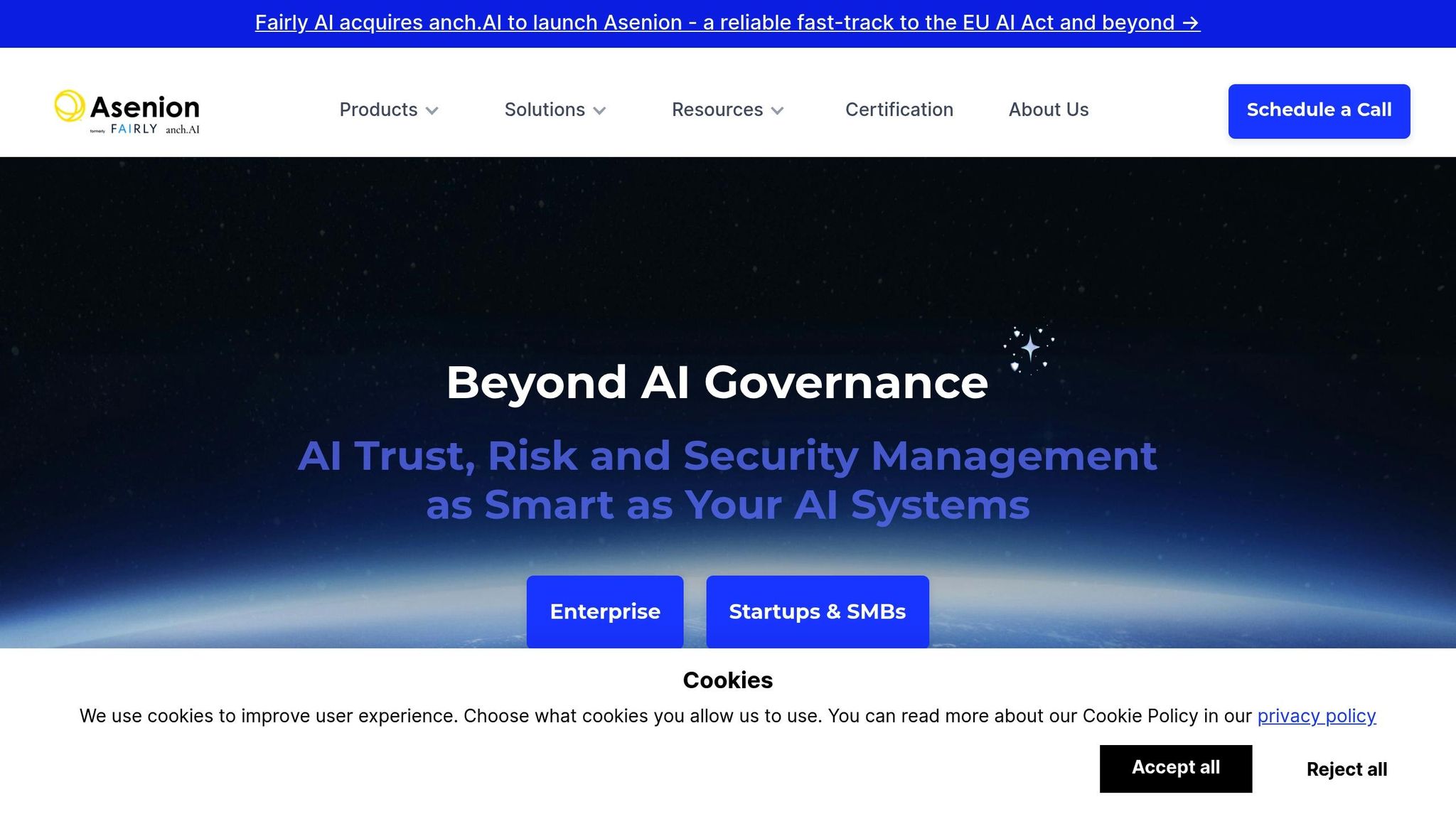
Fairly AI provides a governance platform designed to promote responsible, transparent, and auditable artificial intelligence. At the heart of this system is its patent-pending AI TRiSM technology, which integrates built-in controls and testing tools to ensure accountability.
One of Fairly AI's standout features is its robust model documentation, which captures every stage of the AI development process. This includes tracking data sources, preprocessing steps, algorithms, and performance metrics, creating a detailed audit trail. This level of documentation isn't just about keeping records - it equips internal auditors with the tools they need to thoroughly analyze AI model behavior.
The platform also includes explainability tools that demystify AI decision-making processes. These tools highlight biases and provide clear executive and compliance reports, using intuitive traffic light signals to summarize findings.
In August 2023, a financial services company adopted the Fairly AI Governance platform to tackle visibility issues with their AI models and algorithms. The results were transformative - transparency improved significantly, offering the company a clearer understanding of their AI systems and model behaviors. The platform's auditing and monitoring features allowed the organization to identify and address potential risks proactively, mitigating operational disruptions.
Fairly AI prioritizes compliance by offering continuous performance monitoring paired with automated alerts for deviations. Its reporting and testing capabilities are tailored to help organizations meet regulatory standards while implementing AI frameworks and policies effectively.
The platform's impact was recognized in 2021 when it won the UBS Future of Finance Challenge for Tech and Cyber Security. The award highlighted its commitment to responsible AI practices:
"Fairly's solution addresses this challenge and supports transparency and risk protection, by offering a platform for quality assurance needed for responsible AI."
This dedication to quality assurance makes Fairly AI particularly valuable for industries with strict regulatory requirements. Its comprehensive compliance and risk management tools set it apart, making it an essential choice for organizations needing rigorous governance solutions.
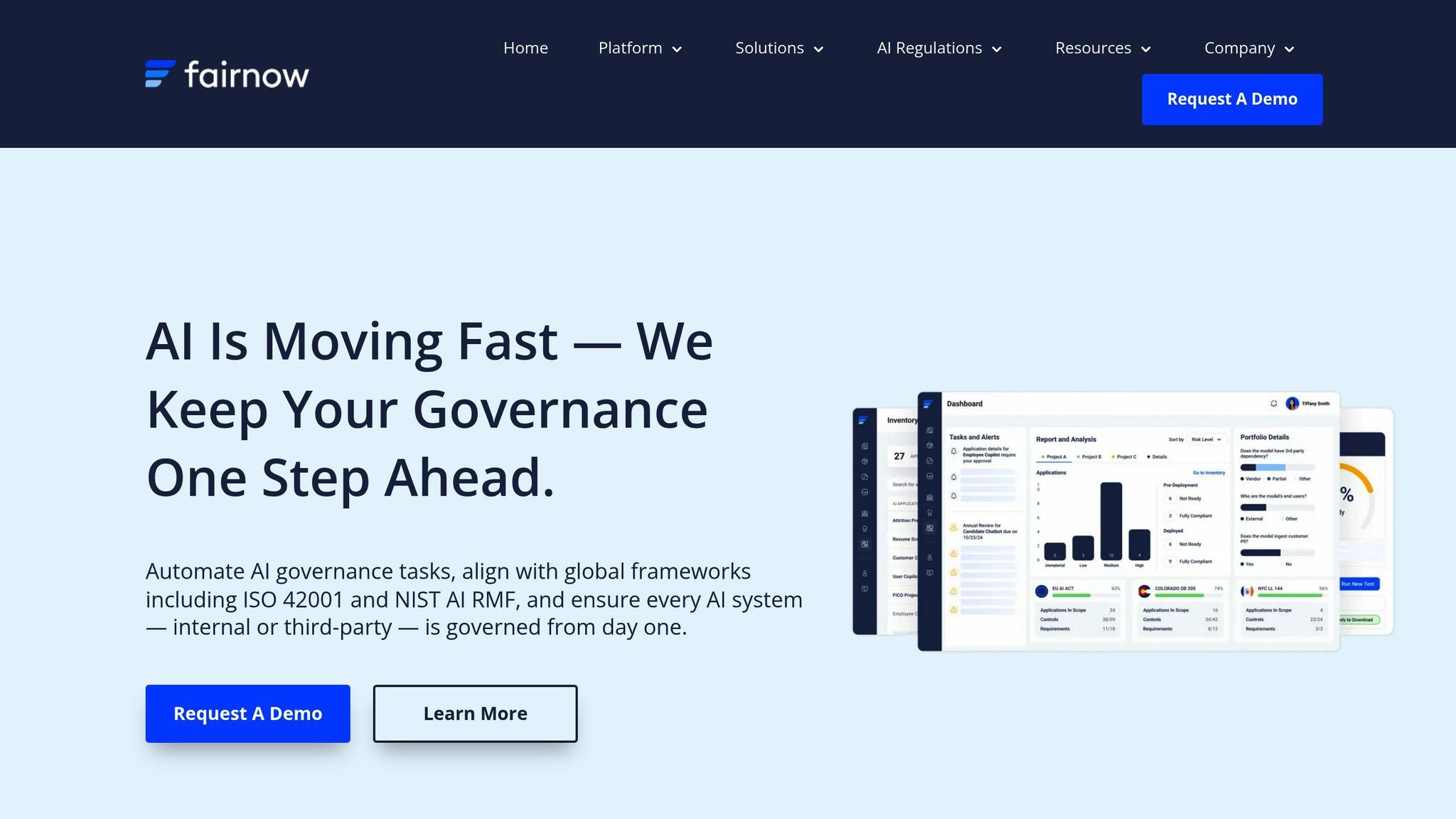
FairNow is a platform designed to tackle AI governance, risk management, and compliance (GRC) challenges. It helps businesses manage AI-related risks while ensuring adherence to regulatory requirements. By integrating with existing infrastructure, FairNow simplifies the process of embedding AI governance into current operations.
One of FairNow’s standout features is its ability to integrate effortlessly with existing business systems. It connects with MLOps tools, governance frameworks, and workflow automation platforms, creating a streamlined compliance process that scales with ease. This compatibility ensures businesses can quickly incorporate AI governance without overhauling their current setups. By embedding itself into the existing ecosystem, FairNow establishes a strong foundation for regulatory compliance.
With rising regulatory demands, FairNow takes charge of monitoring both internal and third-party AI systems using established GRC tools. This ensures a thorough and unified approach to governance. By maintaining oversight across all AI systems, businesses can confidently build and manage reliable AI solutions while adhering to consistent governance standards.

Domo takes a data-focused approach to AI governance, combining business intelligence with advanced analytics to provide control, ensure compliance, and boost efficiency.
Domo simplifies integration by connecting to hundreds of data sources and business applications through pre-built connectors. This seamless connectivity allows organizations to unify governance oversight, monitoring AI performance and compliance metrics from various systems in real time.
With its cloud-native architecture, Domo supports quick deployment and scaling, making it ideal for businesses with distributed workflows. Its API-first design further enables custom integrations, allowing companies to embed governance monitoring into their existing processes without causing disruptions.
Domo enhances visibility with interactive dashboards that display governance metrics and compliance indicators in real time.
Its audit trail functionality records detailed logs of AI decisions, data usage, and workflow changes. This level of tracking ensures organizations can meet regulatory requirements and pass internal audits with ease. Additionally, Domo's automated alert system flags governance violations promptly, enabling teams to address issues before they escalate.
Domo provides tools to monitor AI workflow costs and identify inefficiencies, helping organizations manage resources effectively.
With its resource monitoring features, the platform offers insights into usage patterns and performance metrics, enabling smarter budget planning and resource allocation. This data-driven approach helps businesses optimize their AI infrastructure spending while maintaining effective governance.
Domo simplifies compliance by generating automated reports, tracking data lineage, and implementing role-based access controls.
Its governance framework includes tools for monitoring data quality, safeguarding privacy, and assessing risks across AI workflows. Custom compliance dashboards provide a clear view of regulatory requirements, helping organizations stay aligned with standards while maintaining operational efficiency.
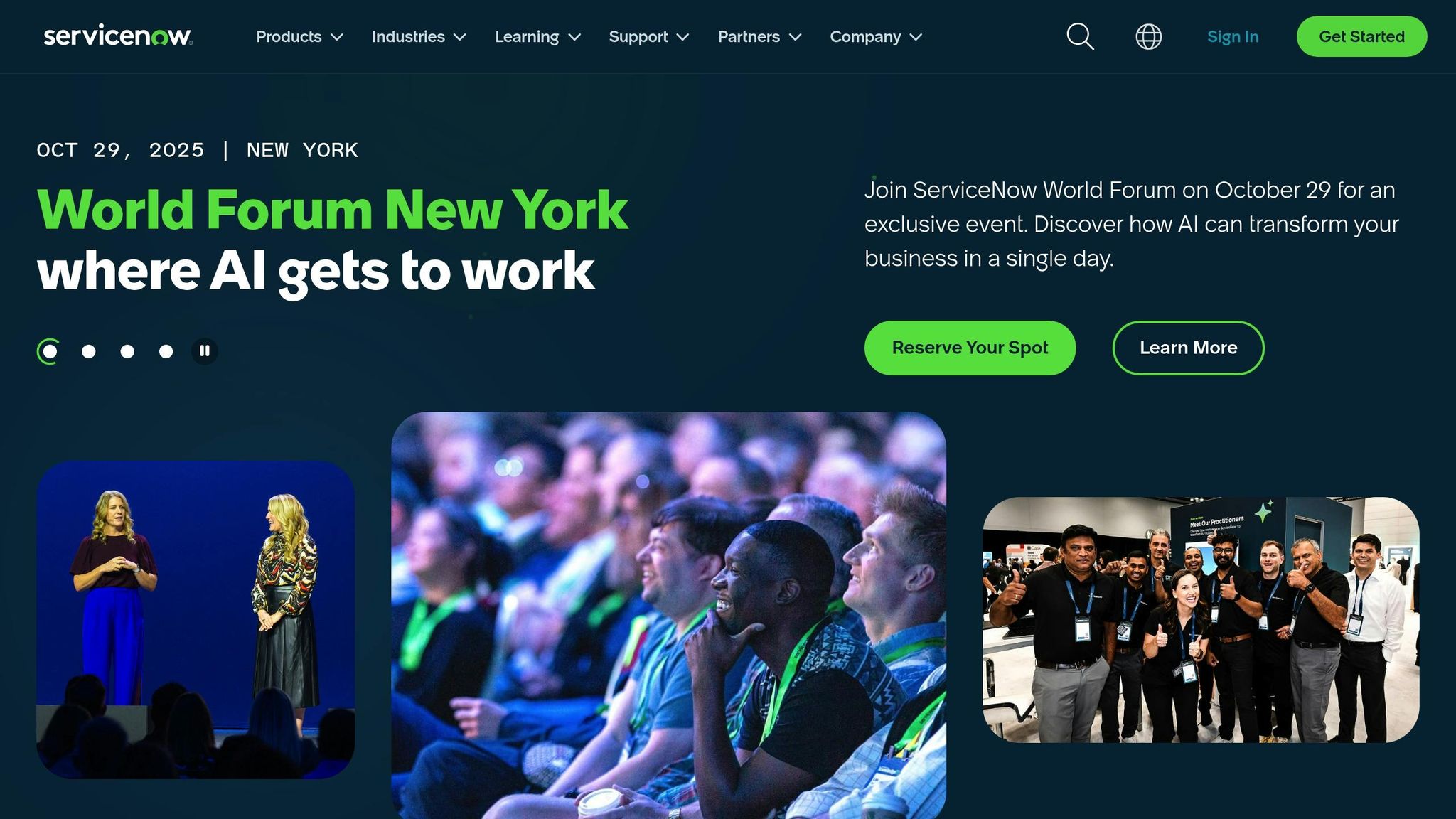
ServiceNow's Now Platform stands out in the growing field of AI governance by combining powerful workflow automation with strategic oversight. It integrates smoothly with existing IT systems, making it a reliable choice for managing AI workflows and ensuring governance.
ServiceNow’s platform leverages its IntegrationHub to connect with a variety of enterprise applications, ensuring consistent governance across diverse AI workflows. Its REST API framework allows for custom integrations tailored to specific organizational needs, offering flexibility and adaptability.
The platform's orchestration tools streamline compliance by automating verification processes during AI deployment. Teams can set up approval workflows to route AI model updates through key stakeholders, ensuring compliance is met before implementation. This integration effectively aligns operational workflows with governance requirements.
ServiceNow enhances transparency by offering analytics tools that track AI workflow interactions and maintain detailed logs for regulatory compliance. Decision points and user actions are automatically recorded, creating a complete audit trail.
The platform’s visual workflow designer makes governance processes easy to understand for both technical and non-technical teams. This feature simplifies the review of approval chains and provides clear insights into execution logs, ensuring transparency at every step.
With its IT Business Management suite, ServiceNow helps monitor resource usage and spending through automated alerts, ensuring AI projects stay within budget. Its demand management tools also allow organizations to prioritize governance investments based on the value of specific workflows.
ServiceNow’s Governance, Risk, and Compliance (GRC) module supports adherence to regulations like SOX, GDPR, and HIPAA. Organizations can customize these frameworks to address AI-specific compliance needs while aligning with broader regulatory standards.
The platform’s policy management tools enable automated compliance checks across AI workflows. Governance rules can flag potential issues, triggering remediation processes to address concerns proactively and maintain regulatory alignment.
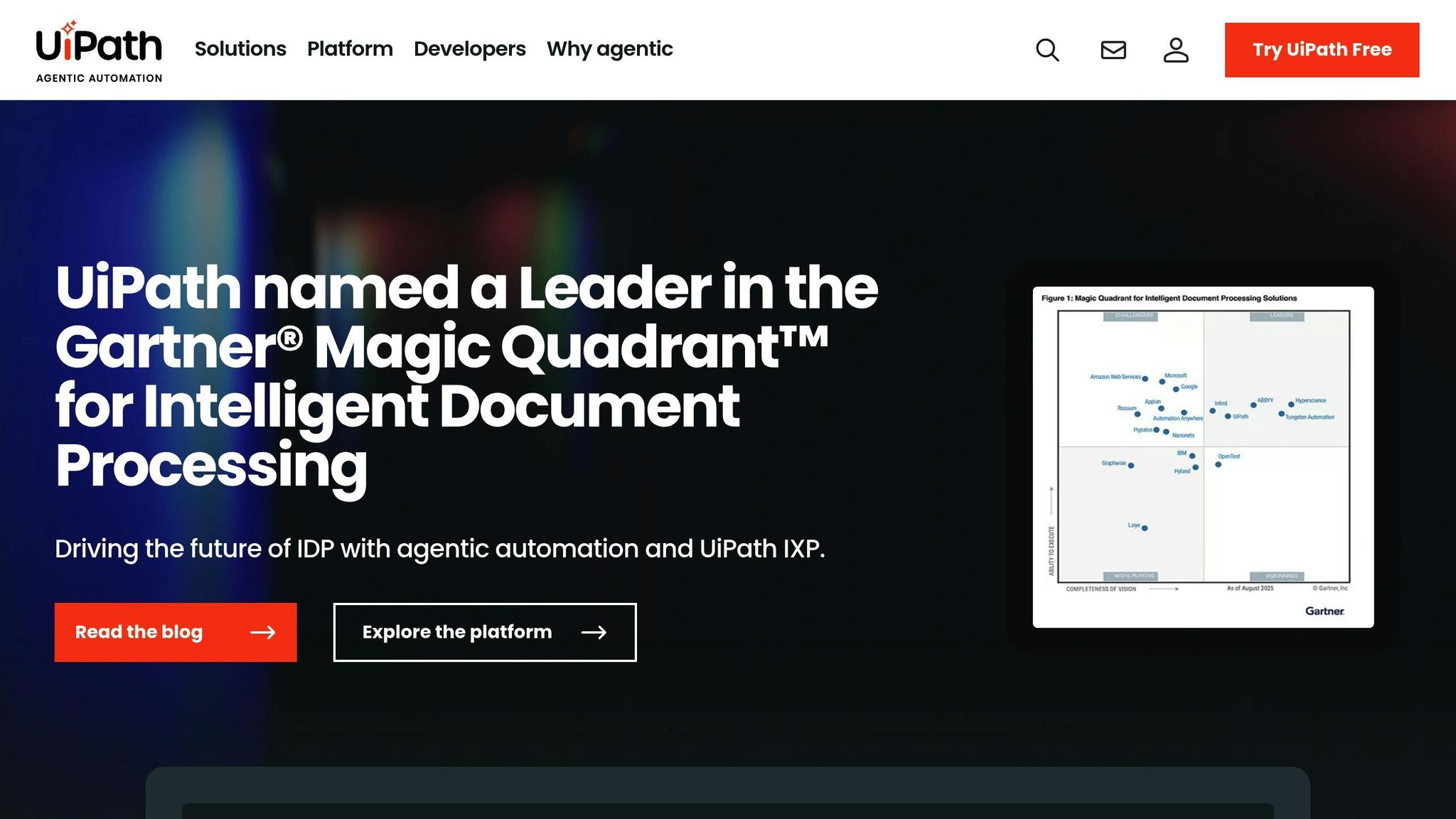
UiPath stands out as a platform that blends scalable automation with detailed compliance measures, making it a solid choice for managing AI-driven workflows. It empowers organizations to oversee automated processes with precision while maintaining thorough audit trails and addressing potential risks proactively.
The platform's automation tools include real-time monitoring to track bot performance and identify anomalies in AI processes. With its integration framework, UiPath connects effortlessly to enterprise systems using pre-built connectors and APIs, ensuring governance oversight without interrupting existing workflows. Additionally, its audit trail functionality automatically records every automated decision and workflow execution, producing detailed logs that assist with regulatory compliance and internal evaluations.
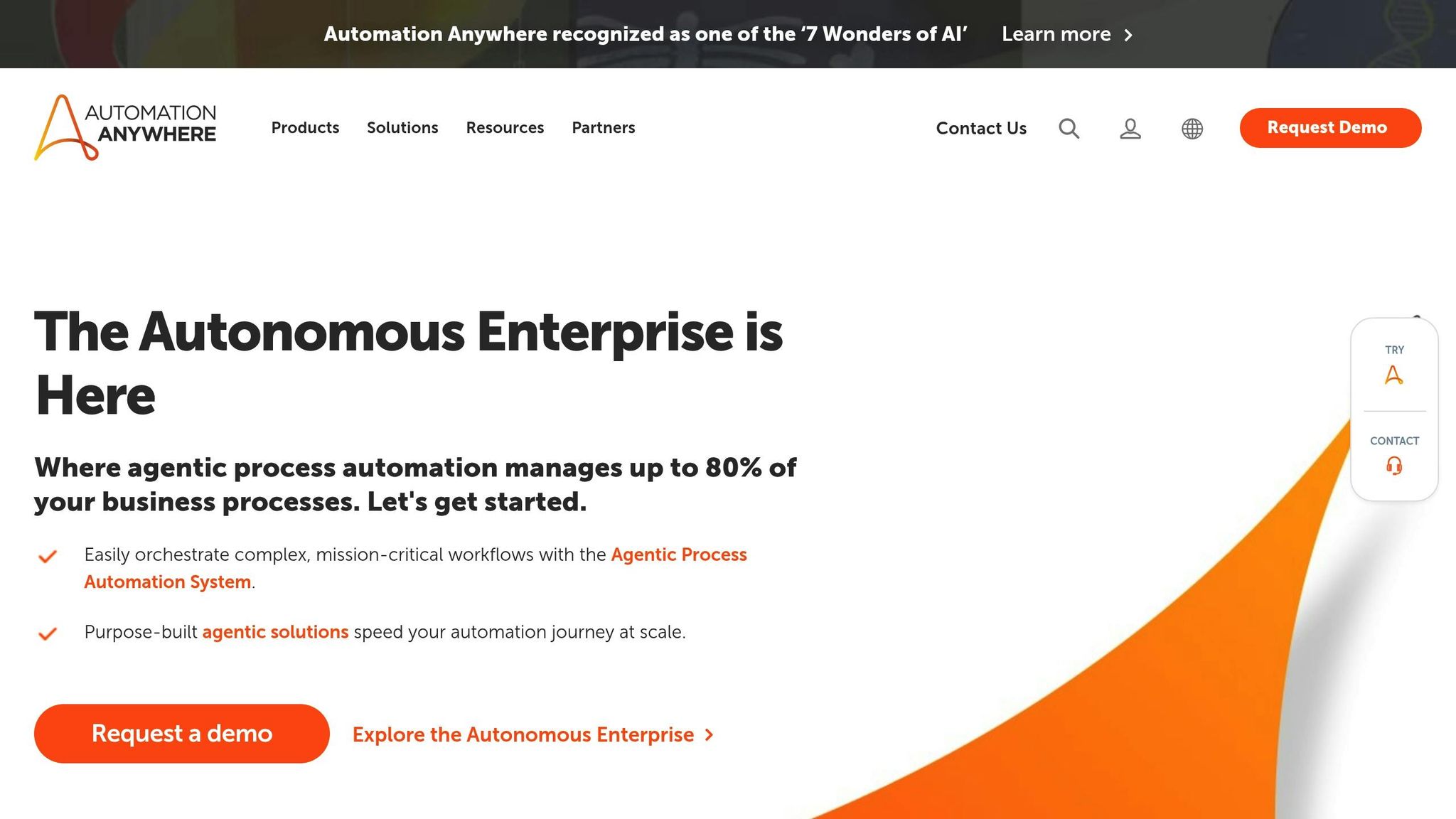
Automation Anywhere plays a key role in managing AI governance within workflow automation, ensuring that regulatory standards are met across various departments. The platform is designed to maintain a balance between compliance, transparency, and seamless integration, making it a reliable choice for overseeing AI workflows effectively.
To meet strict regulatory requirements like SOX, GDPR, and HIPAA, Automation Anywhere employs role-based access controls that limit user permissions based on their responsibilities. Additionally, it offers compliance reporting tools that document workflow executions, user activities, and system changes, ensuring organizations can demonstrate adherence to regulations.
The platform enhances oversight by maintaining detailed audit logs, capturing information such as who initiated actions and when they were executed. Its Control Room dashboard provides real-time monitoring of bots, helping teams quickly identify issues and receive timely alerts for better operational transparency.
Automation Anywhere simplifies integration with enterprise systems through a variety of pre-built connectors, enabling smooth connections to ERP platforms, databases, cloud services, and even legacy applications - without requiring extensive custom coding. Its API integration framework allows governance controls to be embedded directly into an organization’s IT infrastructure, supporting centralized policy management and ensuring compatibility with security and identity management tools.
This analysis builds on platform overviews, comparing their unique advantages and challenges. Understanding these trade-offs is essential for selecting a platform that aligns with an organization’s compliance, transparency, and operational goals.
Prompts.ai stands out for its streamlined AI orchestration, providing access to over 35 leading language models through a single interface. Its pay-as-you-go TOKN credit system eliminates recurring subscriptions, potentially cutting AI software costs by up to 98%. The platform also centralizes controls, making cost tracking and audits more efficient.
Credo AI specializes in risk assessment and regulatory compliance, offering tailored frameworks and automated risk scoring to simplify audits. While its compliance expertise is a major strength, it offers fewer workflow automation features compared to broader governance platforms.
Fairly AI focuses on bias detection and fairness monitoring in AI systems. It provides advanced tools for algorithmic transparency but lacks the broader workflow orchestration capabilities that many enterprises require for comprehensive governance.
FairNow excels in real-time monitoring and alerting for AI model performance. Its analytics dashboards are detailed, but enterprises with complex workflows may find the platform requires significant customization to meet their needs.
Domo integrates robust business intelligence features into AI governance, offering exceptional data visualization and reporting. Its cloud-native architecture ensures scalability, but the pricing structure may be a hurdle for smaller organizations.
ServiceNow leverages its IT service management (ITSM) expertise to deliver extensive workflow governance. It integrates seamlessly with existing enterprise systems, though implementation can be complex.
UiPath combines strong robotic process automation (RPA) features with AI governance, making it ideal for organizations heavily invested in automation. Its visual workflow designer simplifies process creation, but users may require specialized training to maximize its potential.
Automation Anywhere offers robust compliance reporting and role-based access controls, making it highly effective for meeting SOX, GDPR, and HIPAA standards. Its Control Room dashboard provides excellent real-time monitoring, though non-technical users may face a steep learning curve.
| Platform | Key Strengths | Primary Limitations | Best Fit |
|---|---|---|---|
| Prompts.ai | Access to 35+ models, 98% cost reduction, unified interface | Minimal limitations noted | AI-first organizations focused on cost savings |
| Credo AI | Strong compliance expertise, automated risk scoring | Limited workflow automation | Highly regulated industries |
| Fairly AI | Advanced bias detection, algorithmic transparency | Narrow focus on fairness monitoring | Organizations prioritizing AI ethics |
| FairNow | Real-time monitoring, detailed analytics | Requires customization for complex workflows | Firms needing immediate AI oversight |
| Domo | Exceptional BI tools, scalable cloud-native design | Enterprise pricing may deter smaller companies | Large organizations with complex data needs |
| ServiceNow | ITSM integration, comprehensive workflows | Complex implementation process | Enterprises with ServiceNow infrastructure |
| UiPath | Visual workflow design, strong RPA capabilities | Requires specialized training | Automation-heavy organizations |
| Automation Anywhere | Strong compliance tools, role-based controls | Steep learning curve for non-technical users | Enterprises with strict regulatory needs |
The right platform depends on an organization’s existing infrastructure, compliance needs, and long-term AI goals. For those prioritizing cost efficiency and access to modern AI models, Prompts.ai is a strong contender. Meanwhile, firms with rigorous regulatory requirements might prefer platforms like Credo AI or ServiceNow.
Organizations with established automation systems often benefit from platforms that enhance their current workflows, while those starting fresh may lean toward unified solutions that simplify operations and reduce tool sprawl.
Take a moment to assess your organization's priorities and match them with the strengths of each platform. Whether you're seeking broad orchestration capabilities or tools tailored for cost management and compliance, the landscape offers solutions to fit varied needs.
For organizations focused on managing expenses, Prompts.ai stands out with its flexible pay-as-you-go TOKN credit system and compatibility with over 35 leading language models. Its unified interface ensures enterprise-level governance remains intact while simplifying operations.
To make an informed choice, align your main objectives - whether it's reducing costs, ensuring regulatory compliance, or achieving smooth integration - with the platform that best meets those goals. Evaluate each option based on your specific needs for cost efficiency, compliance, and workflow integration to ensure your AI governance remains effective and future-ready.
To select the most suitable AI governance platform for your organization, begin by evaluating your unique workflow needs. Consider factors like compliance with industry regulations, the level of transparency required, and how well the platform integrates with your current systems. It's crucial to ensure the platform includes features like real-time risk monitoring and can scale to accommodate your organization's growth and changing demands.
Focus on solutions that align with your strategic objectives and offer flexibility to adapt over time. By emphasizing these essentials, you can choose a platform that supports efficient, compliant, and transparent AI workflows customized to your business needs.
When incorporating AI governance tools into your enterprise operations, begin by outlining the specific areas of governance and assigning clear accountability. Prioritize transparency and explainability in how your AI systems function, ensuring these practices align with your overall business goals.
Strong data governance is equally important - covering security, privacy, and data quality. Embed governance measures at every step, from sourcing data to deploying AI, and tie these practices to risk management and regulatory compliance. To maintain consistency, assign dedicated roles for oversight, ensuring accountability across all stages of your workflows.
Organizations can stay aligned with regulations like the EU AI Act and NIST guidelines by using AI governance platforms tailored to meet these standards. These platforms often incorporate frameworks such as the NIST AI Risk Management Framework, enabling businesses to identify, evaluate, and address AI-related risks effectively. This ensures a structured approach to transparency, safety, and oversight throughout the AI lifecycle.
With features like compliance dashboards and in-depth metrics, these tools provide real-time monitoring of adherence to both U.S. and European regulations. They simplify the complexities of regulatory tracking while fostering proactive risk management, equipping businesses to confidently handle intricate international requirements.


